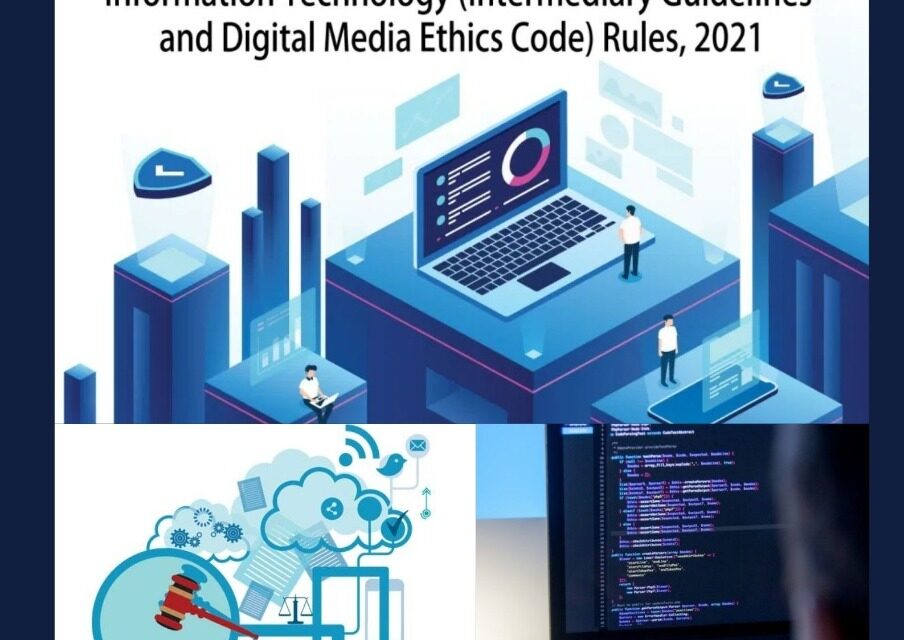Whether Intermediary Guidelines 2021 are unjustified on legal principles


Rohit Kumar
The recently notified Intermediary Guidelines and Digital Media Ethics code 2021 (Guidelines 2021) is the most debated law passed in India in the last few months. Tech giants and media groups are pushed to make certain changes in their policy and corporate structures. The legal validity of the guidelines has already been challenged for various reasons in Delhi, Karnataka, and the Kerala High court. The Guidelines are also criticized for passing it without consultation with stakeholders, which is a contravention of the government’s pre-legislative consultation policy. A few weeks ago, Delhi police raided Twitter’s office to give notice of non-compliance with these guidelines. Subsequently, the news is that Twitter has lost protection under the IT Act for non-compliance with the 2021 Guidelines.
These guidelines have been placed to deal with the rapidly changing dimension of transmission of information through internet platforms. Stakeholders condemned these guidelines on various accounts. However, the plain reading of these guidelines reflects some drafting errors that are causing inconsistency with the common-law principles.
Safe Harbour Protection
The Information Technology Act 2000 (IT Act) is the governing law of India that deals with digital space, the internet, and services related to it. The act defines intermediary, computer resources, punishments, and safeguards. One of the important safeguards provided under the IT act is the safe harbor protection under section 79 of the IT Act. Interestingly, provision of the safe harbor was absent in the IT Act initially, however, certain amendments were made in 2008 in the aftermath of the Avinash Bajaj Vs State case, popularly known as the DPS Scandal. By virtue of the 2008 amendment, key provisions like safe harbor protection, Section 69A, and various punishments were added.
The Intermediary Guidelines 2021 tend to dilute this protection and attempts to increase the liabilities on intermediaries in India, that otherwise enjoy safe harbor protection under section 79 of the IT Act. Rule 7 of the guidelines lay down that
- Non-observance of Rules.—Where an intermediary fails to observe these rules, the provisions of sub-section (1) of section 79 of the Act shall not be applicable to such intermediary and the intermediary shall be liable for punishment under any law for the time being in force including the provisions of the Act and the Indian Penal Code.
The purpose of Rule 7 is to put an obligation on intermediaries to comply with the law, otherwise, as the rule says the intermediaries may lose their safe harbor protection. However, neither is it possible nor legally justified because whether a platform is an intermediary or not, it is not dependent upon any special status or certificate granted by any authority. It is just legal protection granted to the platform from the action of a third party.
In Myspace Inc. v. Super Cassettes Industries Ltd., the Division Bench of Delhi High Court held that Section 79 of the IT Act is not an ―enforceable provision, but merely provides ―affirmative defense to entities that fulfill the criteria set forth therein.
51… The true intent of Section 79 is to ensure that in terms of globally accepted standards of intermediary liabilities and to further digital trade and economy, an intermediary is granted certain protections. Section 79 is neither an enforcement provision nor does it list out any penal consequences for non-compliance. It sets up a scheme where intermediaries have to follow certain minimum standards to avoid liability; it provides for an affirmative defense and not a blanket immunity from liability.
Further, while ascertaining whether a platform qualifies for the protection under section 79, the division bench of the Delhi High Court in another case Amazon Seller Services Pvt Ltd vs Modicare Ltd & Ors held that the activities of the platform to avail safe harbor protection can only be decided on the basis of the evidence produced in a trial. The court held as follows,
- Section 79 of the IT Act is a safe harbor for online marketplaces, limiting their liability for third-party information posted on their systems. It is to ensure that the liability for non-compliance and/or violation of law by a third party, i.e. the seller, is not fastened on the online marketplace. In holding that Amazon is in fact not an intermediary, the learned Single Judge has obviated the need for any evidence to be led in the matter.
Specialized law prevails over the general law
Rule 7 further lays down that if the intermediary does not comply with the guidelines, it will be held liable for the punishment under IT Act and Indian Penal Code. This approach is also contrary to the principles of law that a Specialized law prevails over general law. In the context of the IT Act Supreme Court of India in Sharat Babu Digumarti vs Govt Of Nct Of Delhi held that
32….Once the special provisions [IT Act] having the overriding effect do cover a criminal act and the offender, he gets out of the net of the IPC…. It is apt to note here that electronic forms of transmission are covered by the IT Act, which is a special law. It is a settled position in law that a special law shall prevail over the general and prior laws.
Therefore, the lawmakers erred in drafting the provision of Rule 7 of the Intermediary Guidelines and does not justify the principles of law. Another contentious provision of the Intermediary Guidelines 2021 is making the Chief Compliance Officer of the platform liable for the contravention takedown request. This provision is inconsistent with the intent of Section 85 of the IT Act 2000 that provides
- Offences by companies-
(1) Where a person committing a contravention of any of the provisions of this Act or of any rule, direction, or order made thereunder is a company, every person who, at the time the contravention was committed, was in charge of, and was responsible to, the company for the conduct of the business of the company as well as the company, shall be guilty of the contravention and shall be liable to be proceeded against and punished accordingly:
Provided that nothing contained in this subsection shall render any such person liable to punishment if he proves that the contravention took place without his knowledge or that he exercised all due diligence to prevent such contravention.
Whereas, Rule 4 specifically provided that the Chief Compliance Officer will be held responsible. This provision is critical because Intermediary Guidelines 2021 are silent on issuing reasonable takedown requests, this simply means that the compliance officer has to remove the content after receiving a request from the appropriate government irrespective of whether the Community Guidelines or any other policy of the particular platform are violated. Giving a reasonable order is also a requirement under the Shreya Singhal Vs Union of India case that ruled – reasons have to be recorded in writing in such blocking order so that they may be assailed in a writ petition under Article 226 of the Constitution (para 109).
This reflects that Section 85 of IT Act 2000 and Rule 4 of the Intermediary Guidelines 2021 are inconsistent with each other. However, the question arises whether Rules made under an act prevail over the parent act?
Parent Act prevail over subordinate rules
The Supreme Court of India in State of U.P v Renusagar Power Co held that., “if the exercise of power is in the nature of subordinate legislation, the exercise must conform to the provisions of the statute.” Further, in Babaji Kondaji Garad Etc vs The Nasik Merchants Co-Operative, Supreme Court held that – “If there is any conflict between a statute and the subordinate legislation, the statute prevails over subordinate legislation and the bye-law if not in conformity with the statute to give effect to the statutory provision the rule or bye-law has to be ignored”. Thus, in the future, if there will be any inconsistency in interpreting the liabilities of the officer of the company, Section 85 of the IT Act will prevail over Rule 4 of the Intermediary Guidelines 2021.
Legislative Overruling
India is a constitutional democratic set-up, where Constitutional Courts have the power of judicial review. Our legal system is based on the principle of stare decisis. Cases decided by constitutional courts become precedent and have to be followed in later cases of similar nature. The decision rendered by the Constitutional court interpreted the law and it superseded the bare reading of the statute. Now, another question arises whether a legislative body can pass a law to nullify the effect of the judgment of the constitutional court, and the answer is no. Legislative overruling is not permissible under the common law framework. The Supreme Court in Asst. Commnr. Of Agri. Income Tax & … vs M/S. Netley ‘B’ Estate & Ors.
(8) In exercising legislative power, the legislature by mere declaration, without anything more, cannot directly overrule, revise or override a judicial decision. It can render judicial decisions ineffective by enacting valid law on the topic within its legislative field, fundamentally altering or changing its character retrospectively. The changed or altered conditions are such that the previous decision would not have been rendered by the court if those conditions had existed at the time of declaring the law invalid.
These doctrines are currently relevant in the context of interpretation and practicality of the Intermediary Guidelines and Digital Media Ethics Code 2021 The bare reading of these guidelines reflects that these are not justified on the principles of law and are not fulfilling the purpose. The principles of jurisprudence say that laws are being made for the benefit of the people. These benefits should be justified on the needs of the society while protecting the rights and liberty of the people, which is certainly not the case with the 2021 guidelines. A lex iniusta non-est lex, another common law doctrine, says that an unjust law is no law at all. Based on these principles of law, it appears that the Intermediary Guidelines 2021 are not justified on the legal principles and it is merely colorable legislation, therefore unconstitutional and beyond the legislative competence of the Union of India.
Rohit Kumar is an advocate practicing in the courts of Delhi. (The opinions expressed in this publication are those of the author/s. They do not purport to reflect the opinions or views of The Policy Observer or our members.)
This article was first published here.
Related Articles
Privatization of Liquor: A Look Into the Loopholes of The Policy
The division of the city was done into 32 zones and licenses were based on the same. In June 2021, the tenders were issued for the application of L-7Z and L-7V licenses. The office of commission of the excise government of the national capital issued terms and conditions for the grant of licenses.
The Information Technology Rules, 2021- A Constitutional Scrutiny
A law prescribing the procedure for depriving a person of his ‘personal liberty has to meet the requirements of Article 19 and if not shall be struck down as arbitrary under Article 14. Liberties and restrictions should run parallel to each other. One overpowering the other would distort the fair working of the constitutional machinery.
Gubernatorial impropriety
The office of the Governor is slowly and steadily being converted into an extended political branch of the central government. The scale and scope this time around are more than ever before! Are we ready for the implications this will have on National Unity and the dent it will cause to the constitutional principles of Cooperative Federalism, Constitutional Morality, and Democracy?









